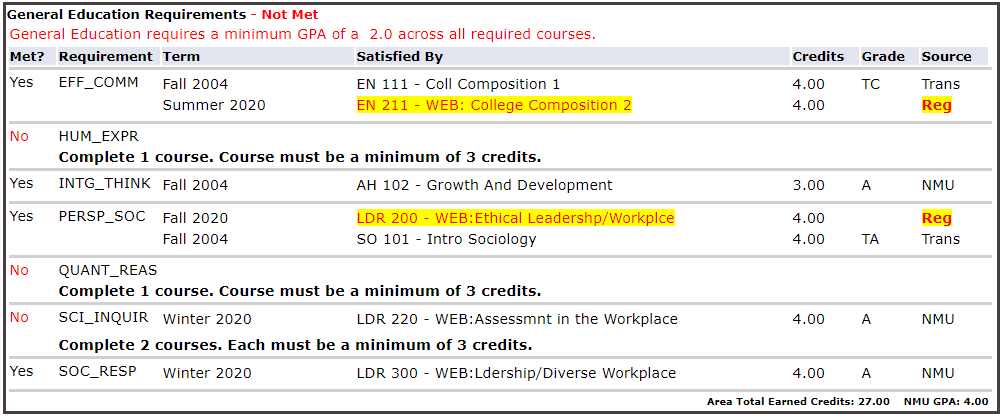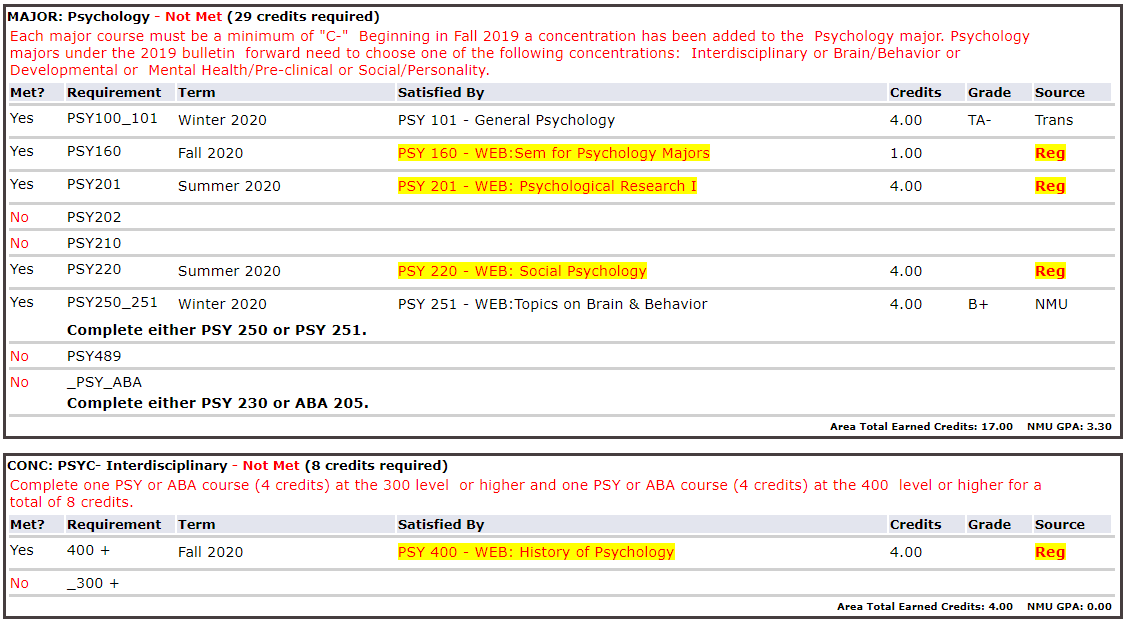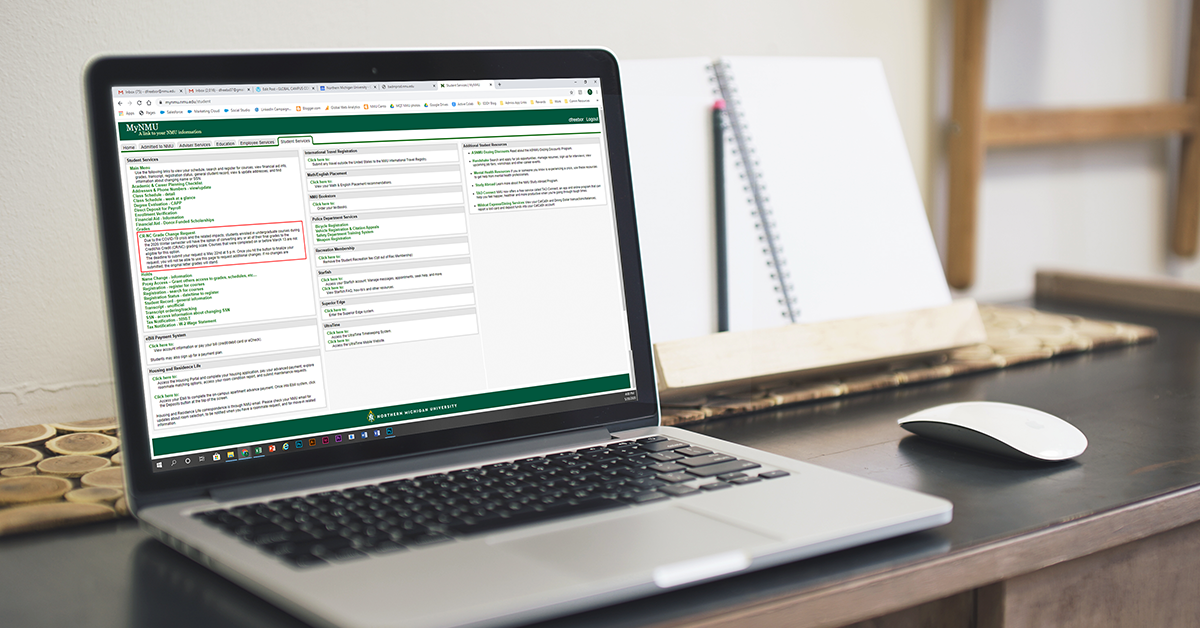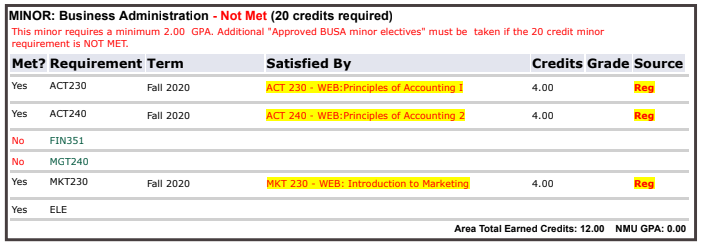Your Curriculum, Advising, and Program Planning (CAPP) degree evaluation is an advising tool used by both students and advisers to evaluate completed coursework against degree requirements. It is an automated record of your progress toward degree completion. It also shows all of the requirements needed to receive the degree you’re pursuing and which courses are used to meet those requirements.
As you are working toward degree completion, your CAPP should be checked regularly to monitor your progress – we suggest checking at least once each semester. You can run a CAPP by logging into MyNMU, selecting the “Degree Evaluation – CAPP” tile (see the highlighted tile in the image below).

If you have prior NMU credit and/or transfer credit, both should appear in the CAPP. If you believe you have additional courses that are not reflected on your CAPP, please contact your primary academic adviser, and they can look into it.
There are several different sections of the CAPP. Below is an explanation of each as you read from top to bottom. Run your own CAPP and compare it to the sample images below for tips on how to interpret the requirements listed in each section.
Degree Evaluation Report


The box on the left reflects your student record at the time the CAPP was run. You will see the date the CAPP was run (20-MAY-2020), the catalog term (Winter 2020), level (Undergraduate), degree (Bachelor of Science), and major (Applied Workplace Leadership) in this sample. If you have a concentration and/or minor, those would also appear in this section of your CAPP. This sample does not have a minor or concentration.
In the box on the right, you can also see the total required credits are not met as the sample only has 96 actual credits of the 120 required credits. The 30 required NMU credits are met as this sample shows 84 credits (this student likely has 12 transfer credits).
The final thing to note here is the minimum 2.0 overall GPA has been met with a 3.82 GPA. This section of your CAPP will change as you register and complete courses. Consider this your high-level progress check toward degree completion.
General Education Requirements


The General education section requires a minimum of a 2.0 GPA across all categories. It includes 10 courses broken into the following categories: Effective Communication, Human Expression, Integrative Thinking, Perspectives on Society, Quantitative Reasoning, Scientific Inquiry, and Social Responsibility. In the image above, you can see the full General Education section is “Not Met.”
The left-hand column shows the “Met?” status for each category with “Yes” or “NO.” You can see in the image above that the Human Expression, Quantitative Reasoning, and Scientific Inquiry requirements are not met. The Scientific Inquiry category requires two courses, so in this example, another course is needed in addition to LDR 220. Make note that the Effective Communication, Perspectives on Society, and Scientific Inquiry categories all require two courses.
Note: Registered courses are applied toward meeting requirements on the CAPP. A category will indicate ‘Yes’ or met, but successful completion of registered courses is still required (see yellow highlights above to see “Reg” aka registered courses).
NMU Graduation Requirements


Whenever possible, you should select courses that double count between your General Education and NMU Graduation Requirements. Common category combinations are Scientific Inquiry and Lab Science, Quantitative Reasoning and Math Competency, Social Responsibility and World Cultures, and Effective Communication and Written English Competency. Ask your adviser about any courses that are required for your major that will also meet these requirements. Double counting can occur between General Education, NMU Graduation Requirements, and Major courses.
Major & Concentration


The image above is a sample from a Psychology CAPP. This major requires a concentration that you can see in the section directly below the major requirements. You can see the individual required courses for this major, based on their catalog term of Fall 2019, in the second column from the left.
Reviewing the unmet requirements, this student still needs to complete the following major courses: PSY 202, PSY 210, PSY 489, either PSY 230 or ABA 205, and a PSY 300+ elective course.
Each major may require minimum grades or an overall GPA – pay special attention to any text in red in this section on your own CAPP. All courses used in this major must have a minimum grade of a C- or higher.
Minor
Not all majors require a minor; however, any student can choose to declare a minor. Your minor will appear directly below your major and concentration requirements on your CAPP. The required courses will be listed similarly to the major courses.
In the sample Business Administration minor shown above, the student is registered for ACT 230, ACT 240, and MKT 230 for the Fall 2020 semester. They have the following required courses remaining to complete this minor: FIN 351 and MGT 240. This minor requires a minimum 2.0 GPA and a minimum of 20 credits.
General Electives
General Elective credits are used once all required courses are complete, but you have not yet met either the minimum 120 overall credits for a degree (or the minimum 30 credits from NMU for transfer students). In the image above, the student is using transfer credit and prior NMU credit for electives. Work with your advisor to review any courses listed as electives on your CAPP or to discuss the need for them to complete your degree.
Official Degree Evaluation


Although you and your adviser can run an unofficial CAPP at any time, degree evaluations are not official unless they are run and reviewed by the Registrar’s Office. In the sample above, you can see the highlighted “Official Degree Evaluation” at the top. When a student registers for graduation, this triggers and official degree evaluation by the Registrar’s Office to verify eligibility.
Your CAPP is the best tool to help you map our your plan of study to complete your degree and your adviser is always a great resource to get answers to any questions you have.








